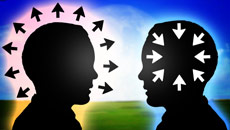Mapping how your eyes respond to watching television can lead to early detection of diseases such as glaucoma, one of the leading causes of blindness worldwide, research shows.
The research could help speed up diagnosis, enabling clinicians to identify the disease earlier and allowing treatment to begin before the onset of permanent damage.
"We have found we can identify patients with glaucoma by monitoring how people watch TV," said David Crabb, lead researcher and Professor of Statistics and Vision Research at the City University London in Britain.
"Once the damage is done it cannot be reversed, so early diagnosis is vital for identifying a disease, which will continue to get more prevalent as our population ages," Crabb added.
Affecting around 65 million people worldwide, glaucoma describes a group of eye conditions that result in progressive damage to the optic nerve, which connects the retina to the brain, causing people to gradually lose vision.
The researchers compared a group of 32 elderly people with healthy vision to 44 patients with a clinical diagnosis of glaucoma.
Both groups underwent standard vision examinations and disease severity was also measured for the group with clinical diagnoses.
Participants were then shown three unmodified TV and film clips on a computer, while an eye-tracking device recorded all eye movement, and particularly the direction in which people were looking.
These data were then used to produce detailed maps, which enabled the diagnosis of glaucoma.
The study appeared in the journal Frontiers in Aging Neuroscience.





